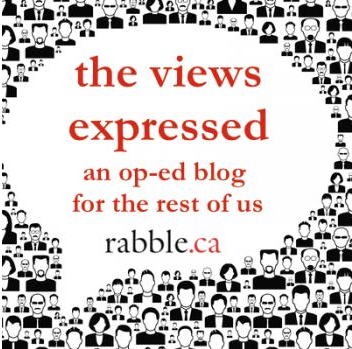Like this article? rabble is reader-supported journalism. Chip in to keep stories like these coming.
Ah, civics. The favourite subject of no more than a handful of the student body.
Remember those mock elections? Everyone learned incredibly basic summaries about Canadian political parties, and then filled out ballots to see who the class would elect?
Spoiler alert: fringe parties do exceptionally well. The fringier, the better, in fact.
Imagine if they were carried out like real elections in Canada, very few of us would have voted.
Here’s what I mean. It’s no secret that young people are disengaged from the political process. A significant issue for many youth is that the ballot-casting process is complicated, nebulous and all around discouraging. In other words, it’s not nearly as simple as many of us were told.
While ripe with good intentions, mock elections are unproductive for many reasons, the first of which is their comical lack of authenticity.
In the real world of civic participation, no one comes to you with a ballot, like the teacher’s pet does in class. The only teachable moment is for students who happen to be absent on that particular day: when you’re not there, your vote isn’t counted.
Realistic mock elections would be much more informative, in spite of the fact that considerably fewer students would participate.
For example, first and foremost, voting would have to take place outside of the classroom. The poll locations would be chosen based on student’s address’ from 4 years ago. Those with new addresses would need to register. An additional process requiring individual research.
Advanced voting would be held. But it would take place over a long weekend (just like the current Federal Election) and only in one location, which they have to know about ahead of time.
All student voters would be required to provide valid ID, that satisfies the Elections Canada guidelines. What are those guidelines? More research!
Most importantly, this exercise would not be mandatory. However, students would be deeply “encouraged” to participate.
So what would happen?
Student 1 (let’s call her Leah) didn’t vote because of the ID requirements.
Leah’s parents recently divorced. Her birth certificate is at her father’s place in Ottawa, along with her passport, which is probably expired anyway. Her mother pays rent and utilities, so there’s no using bills. She walks dogs in the neighbourhood for spending money, and doesn’t receive pay stubs. Leah is 16, but she primarily cycles and her mother doesn’t own a car. There’s no use for her to spend about $150 to get a driver’s license. Leah could have used her health card and a prescription label, but she wasn’t exactly comfortable with the idea of showing strangers her new birth control.
Student 2, Nira, was going to vote, but election day conflicted with her swim meet, and she was visiting family over the long weekend.
And then there was John, Student 3. His parents are very political. He completed all of his required volunteer hours helping his local candidate. Not only did John vote, but all of his friends — in spite of being generally disinterested in politics — voted. He made sure to break down exactly what ID they would need, and helped them find their ballot box.
These students knew it would ultimately benefit them to complete the assignment. However, when faced with the barriers of inconvenience, it didn’t seem to be worthwhile for some. Especially when voting is framed as a nice-to-have, and not a necessity.
Just last year, Elections Ontario decided to name their entire operation, “We Make Voting Easy”. Try as they may, staff attempt to make it easy, but it’s the politicians that make it difficult.
This problem is getting worse. Case in point: The Fair Elections Act.
That bill originally proposed putting an end to voter education initiatives including Student Vote Week, Election Canada’s mock vote exercise, which is an improvement from the aforementioned, but is still not very realistic. In any case, it’s likely much better than the government’s proposal to leave engagement to parties and candidates.
In April, Conservative MP Pierre Poilievre who introduced the bill said, “the message to voters is clear: get ID, from now on, you will require it to vote”. Easier said than done, Minister.
The list of supplementary ID options may appear extensive, but most are generally inaccessible to young people.
If politicians practiced what they preached, they wouldn’t push these measures, or make “convenient” advanced voting a choice between participation, and turkey dinner. It was a choice to hold the election on October 19th, leaving advanced polls to fall over the long weekend.
In order to increase the youth vote, we need to come to grips with the realities of millennials. Young people move around; having a fixed address is a luxury for many of us. Thus, there should be more clear, consistent communication of the options.
Mock votes didn’t teach us we could use our prescriptions as proof of address. It’s frankly quite intimidating to swear an oath. The assumption that voters have agency and confidence is at the core of the naivety that leads political elites to say things like “if you don’t vote, it’s your own fault!”
Are millennials really just lazy? Or can we finally recognize the process leaves youth behind?
Claire has been a community advocate and youth mentor since high school. She spent 5 years with the Toronto Youth Cabinet, including 2 as Chair, fighting for a more equitable and accessible city. She has developed civic engagement workshops on subjects including deputations and the municipal budget process. She continues to volunteer with youth capacity-building and peer mentorship initiatives, and is an active steering committee member of Women in Toronto Politics. Claire currently works in the nonprofit sector, designing volunteer management resources for grassroots organizations and causes. Twitter: @ClaireMcWatt Website: www.clairemcwatt.com
Like this article? rabble is reader-supported journalism. Chip in to keep stories like these coming.



